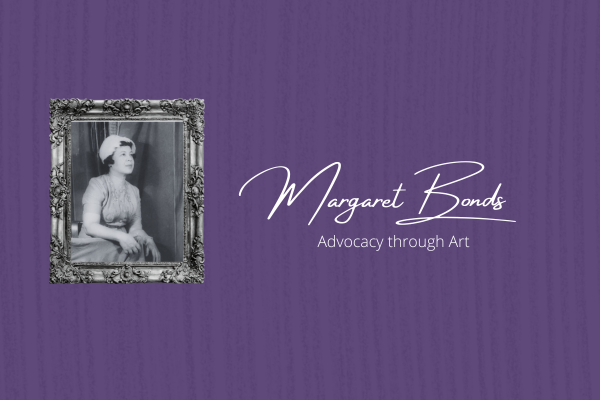

Music has to be human, and people have to like it; it has to move them spiritually and intellectually.—Margaret Bonds
The music of Margaret Bonds is filled with struggle, triumph, and joy, crafted in a neo-romantic style that draws on gospel, jazz, and blues traditions. Many of her works reflect the Black experience in mid-century America, especially the vocal music that ultimately defines her legacy. Bonds’ textures are commanding, at once transcendent and deeply human. The musical prosody of her choral writing, such as that found in her Credo, speaks with immediacy. Lush, expressive string lines and buoyancy in her dueling woodwind and punctuating brass parts, all prominent in The "Montgomery Variations," are hallmarks of her orchestral writing. The uniqueness of her compositional voice shines through in all of her arrangements, even those of well known works, as is the case in her setting of He’s Got the Whole World In His Hand.
Although Bonds is best remembered as a composer, she was also a concert pianist, and worked in both fields for much of her life. She began her career in New York City, where, following composition studies at Juilliard, she was active in the musical theater scene, and toured as a chamber musician and soloist. She collaborated with some of the most prominent Black artists of the Harlem Renaissance, including Langston Hughes, and was influenced by the writings of W.E.B. DuBois and Edna St. Vincent Millay. Through her work with the Negro Theatre Project in Chicago and the Cafe Society in New York, Bonds transformed herself into a musical activist.
Bonds moved to Los Angeles in 1967, where she continued teaching and composing. Sadly, Bonds passed away suddenly in 1972, at the age of 59. Her masterwork, Credo, was performed by the Los Angeles Philharmonic under the direction of Zubin Mehta a month after her passing, making her one of the first African American women composers to have a large-scale work performed by a major orchestra. Bonds left behind a body of work that continues to be heard in concert halls around the world, inspiring listeners with its beauty and its message. Learn more about some of her most powerful pieces below.
I look forward to a time when Credo will move all over the world.—Margaret Bonds
CREDO
This choral work for soprano and baritone soloists with SATB chorus is widely considered to be Bonds’ masterpiece. The seven-movement piece draws on text from W.E.B. Du Bois’ poem “Credo” and promotes racial justice and harmony. Listen to this recent performance of the work by Southwestern University Chorale with the Austin Civic Orchestra under the baton of Lois Ferrari.
THE "MONTGOMERY VARIATIONS"
Bonds composed this powerful orchestral work in 1964 and dedicated it to Martin Luther King, Jr. It is based on the African American spiritual “I Want Jesus to Walk with Me” and was inspired by events and ideas in the civil-rights movement, from the Montgomery Bus Boycott (1955-56) to the 1963 Sixteenth Street Baptist Church bombing that killed four Black girls in Birmingham. Hear this recording of the work by the Minnesota Orchestra and conductor Scott Yoo.
TWO WORKS FOR SOLO PIANO
The two works in this publication, Tangamerican and Fugal Dance, are among the most recently-discovered of Bonds’ works. While Tangamerican, written with the marking “tempo tango,” is melodically and harmonically rich succinct, Fugal Dance has a dramatic shape that proceeds from dissonance, confusion, and strife to a sense of victory and triumph. Experience the world premiere recording of the work by pianist Lara Downes.
HE'S GOT THE WHOLE WORLD IN HIS HAND
Bonds’ arrangement of this spiritual is one of the most popular among those performed today. It was written for soprano Leontyne Price in 1963, and Price frequently performed it in recitals. This rendition by Price captures the soul of Bonds’ setting.
AFRICAN DANCE
This duet for two solo voices with piano features text by Langston Hughes, whose words emphasize the powerful rhythms of African drums and the sensual appeal of the dance. Bonds' work offers an original musical interpretation of Hughes’ text with percussive piano writing throughout and an outburst of virtuosic energy at its conclusion. It is performed here by soprano Nicole Joseph, tenor David Kurtenbach Rivera, and pianist Anton Nel.
ST. FRANCIS' PRAYER
Bonds composed this choral work in 1968. The text for this work is the well-known and timeless "Prayer of St. Francis of Assisi" that begins "Lord, make me an instrument of thy peace. Where there is hatred, let me sow love..." The University of Utah Chamber Choir performs this sensitive setting under the direction of Dr. Austin Thorpe.

